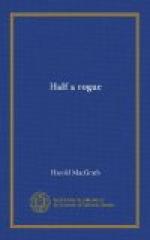Then they proceeded to go over the ground thoroughly. Something must be done with the newspapers. The delegates and minor bosses were already grumbling. Had nothing appeared in the newspapers, Warrington’s nomination would have gone through without even minor opposition. But the Republican machine was in sore straits. If Donnelly won this time, it would mean years of Democratic rule in an essentially Republican town. McQuade must be broken, his strong barricades toppled; and now that there would be no surprise for the public, the majority of the delegates began to look doubtfully upon what they called the senator’s coup. They wanted the City Hall, and they did not care how they got there. Warrington was a fine chap, and all that, but his acquaintanceship was limited. He could not go about shaking hands like Donnelly, who knew everybody, high and low. The laboring man knew nothing about Warrington, save that he was famous for writing plays they had not seen, nor would have understood if they had. Warrington was a “swell”; he had nothing in common with the man who carried the dinner-pail.
“And there the matter stands, my boy,” concluded the senator, shifting his cigar from one corner of his mouth to the other. “If I can swing the convention the rest will be plain sailing, once you start speech-making. Oh, McQuade is clever. He knew that by exposing my hand he would lessen your chances. But you tackle the newspapers and see what can be done. And good luck to you.”
McQuade came down early that morning. The first thing he did was to call on the editor of the Times.
“Here’s something,” he said, tossing a few typewritten pages on the editor’s desk. “This’ll settle Warrington’s hash, Walford.”
“What is it?” asked Walford.
“Read it and see for yourself.” McQuade sat down and picked up the early New York papers.
Walford read slowly. When he reached the last paragraph he returned to the first and read the article through again. He laid it down and faced his employer.
“Mr. McQuade, the Call and the Times are the only papers in town that pay dividends. The Times as it stands to-day is a good, legitimate business investment. Do you want the circulation to drop ten thousand and the big advertisers to cancel their contracts?”
“What’s the matter with the story? Isn’t it all right?”
“Frankly, it isn’t.”
“It’s true,” said McQuade, his fist thudding on the desk; “it’s true, I tell you, every damned word of it.”
“The truth of it isn’t the question. It’s the advisability of publishing it. I say to you that if you insist on this story’s publication, you’ll kill the Times deader than a door-nail. I’ll call the business manager in.” Walford whistled through a tube, and shortly after the business manager appeared. “Read this,” said Walford briefly, “and give Mr. McQuade your honest opinion regarding its publication. Mr. McQuade thinks it ought to run as local news.”




